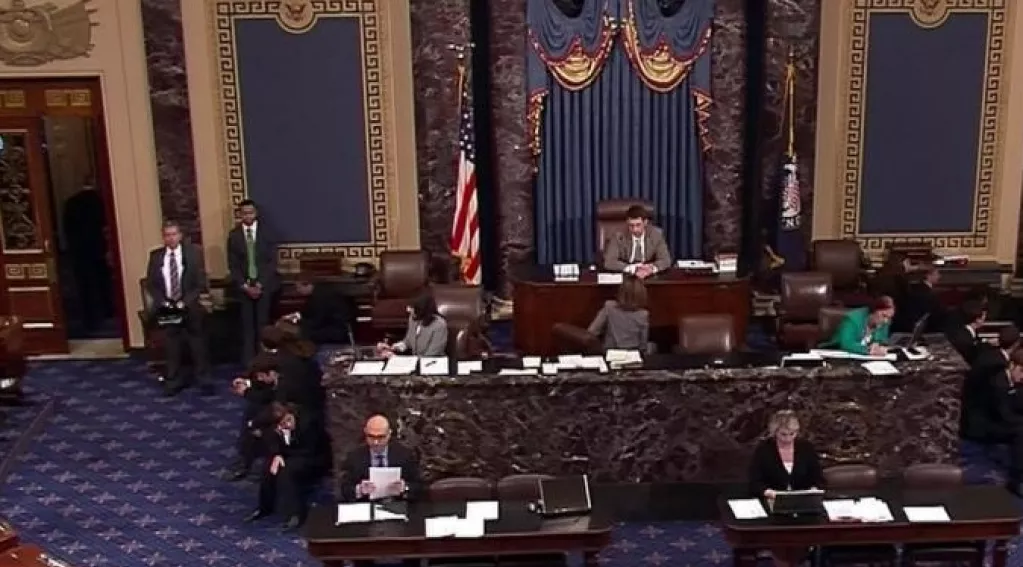Senate Parliamentarian Blocks Largest Amnesty in American History

Late Sunday night, Senate Parliamentarian Elizabeth MacDonough derailed an effort to include amnesty for 8 million illegal aliens in the $3.5 trillion budget reconciliation package, ruling that it would violate the “Byrd rule.” Despite the ruling, Senate Majority Leader Chuck Schumer (D-N.Y.) vowed to explore other ways to legalize millions of illegal aliens using the reconciliation process, which circumvents the Senate’s 60-vote filibuster threshold.
FAIR argued at length that the amnesty provisions in the proposed budget reconciliation package violated the Byrd rule because their primary purpose was to advance separate policy, rather than address the federal budget in an impactful way. MacDonough agreed with that reasoning, writing in her ruling that:
The question before us is whether a series of proposed amendments to the Immigration and Nationality Act(INA) that remove existing barriers to adjustment of status to that of lawful permanent resident (LPR) for a variety of existing and newly created classes of immigrants and non-immigrants, including many not legally present in the UnitedStates, is a policy change that substantially outweighs the budgetary impact of that change (emphasis added).
For supporters of securing our borders, upholding the rule of law, and defending our sovereignty, this was a clear victory. The possibility of tacking on amnesty to the budget reconciliation package was the most significant legislative threat since the 2013 Gang of Eight proposal, as it would have legalized millions of illegal aliens in exchange for nothing –all without a single vote from a Republican lawmaker.
While this is a welcome development, the battle is far from over.
For one, Democrats could choose to overrule the parliamentarian’s decision. This is politically fraught, but it is not impossible. If Schumer and his allies believe that legalizing 8 million people through the process is worth it, they could choose to take the political risk of shattering Senate norms by overruling the parliamentarian or replacing her. However, this is an extreme position and Senator Bob Menendez (D-N.J.) indicated that Democrats do not consider this their first option.
Already, some senators and open-borders organizations have floated the possibility of updating the final year on existing immigration programs like the registry and through 245(i) adjustment. Both would allow illegal aliens who have lived in the U.S. for a certain number of years to become permanent residents.
The 245(i) program allows illegal aliens with U.S. relatives or sponsoring employers to become permanent residents if they pay a $1,000 fee. However, the program currently covers only people whose relatives or employers filed green card petitions for them before April 2001. Democrats could attempt to alter this date and add a sizable fee as a “tax penalty.”
The immigration registry would also allow illegal aliens who have lived in the U.S. since a certain year, without a criminal record and who demonstrate “good moral character,” to receive green cards. That program is even more outdated, and currently applies only to those who entered the U.S.before 1972. But by moving up the years on these programs, Democrats could potentially establish a path to permanent residency for individuals from all of the targeted amnesty categories.
However, both of these changes would have to move through the budget reconciliation process. This means that they would face the scrutiny of the Senate parliamentarian again, who already ruled that the Democraticattempt to use the process to legalize millions of illegal aliens is not possible. Given her latest ruling, it is unlikely that MacDonough would see these changes as anything different.
Again, while the battle is not yet over, the parliamentarian’s ruling confirms what we already knew: amnesty for millions of illegal aliens is a significant policy change that dwarfs its budgetary impact. It does not belong in the budget reconciliation package, and the parliamentarian’s ruling is consistent with Senate norms and precedent. This is something Democrats and advocates must accept.

